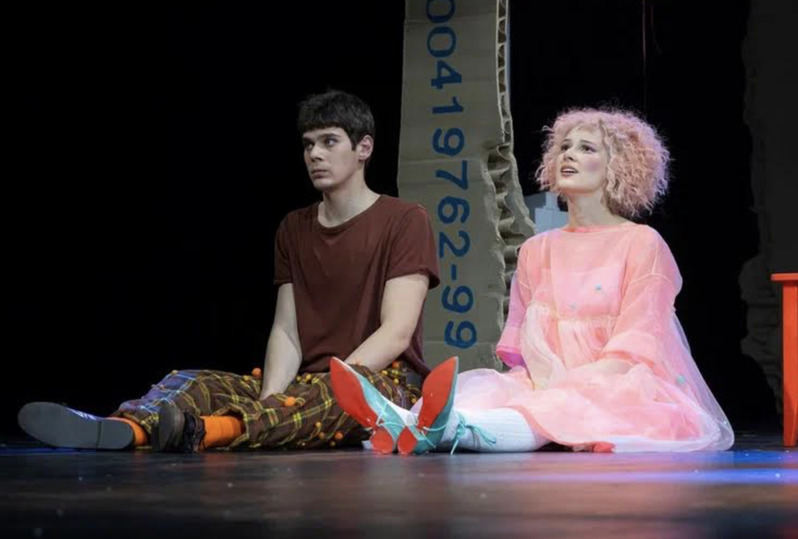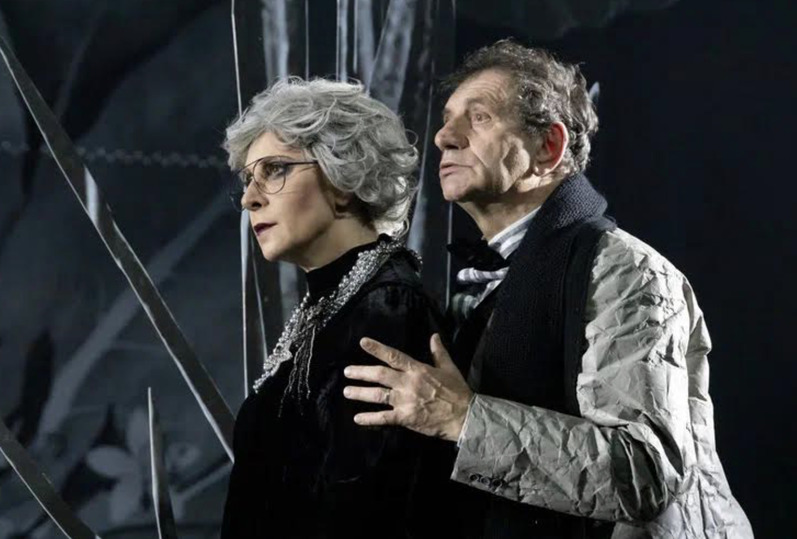A miracle happened in Vakhtangovsky: an ordinary
[ad_1]
“An Ordinary Miracle” is also the music of Gennady Gladkov, with the first sounds of which images of that old film appear before your eyes. “Ridiculous, funny, reckless/Crazy, magical/No sense, no use/Not in tune, completely out of place…” Or: “And the butterfly’s wings are bang-bang, and behind it is a little sparrow…” – well, who still doesn’t sing this from the stage or under their breath? More than one generation of Soviet people grew up listening to songs from “Miracle.” And yet, it is with a musical number about the fact that “ridiculous, funny, reckless, insane…” that Ivan Popovski begins his performance. The wizard (the owner according to Schwartz) sings, sitting in profile on the windowsill of a house white as young snow, which puzzles me and the viewer – will everything really continue to go according to the film?
The fears are in vain – Popovsky, who follows Schwartz’s canonical text, has his own interpretation. Based on a Soviet fairy tale, he published a textbook on… love. Neither same-sex, nor transgender, nor God knows what else, demanded or imposed on humanity by the 21st century. And the one for which – no more, no less – you don’t mind giving your life. And this is the most difficult, almost impossible. In general, a miracle and even an ordinary one, if you believe the author of the fairy-tale play.
“That’s how much I love you,” says the wizard, who is already on the floor next to the metal bed, the white color of which indicates that, alas, it is a hospital bed. For his sick wife, the wizard composes his own love story, cutting out figures of ladies with gentlemen, trees with flowers from ordinary cardboard.
“That’s how I love you,” he will say more than once, with this phrase looping the story of his and his own love. They will intertwine, at some point scatter and even get out of his control to familiar melodies, but with disturbing and sometimes extremely sharp notes sprouted in them.

Three couples – a wizard with his wife (Vladimir Logvinov – Yana Sobolevskaya), an innkeeper with the court lady Emilia (Evgeny Knyazev – Yulia Rutberg, Maria Volkova) and a princess with a bear, which the wizard, for fun, seven years earlier turned into a young man mortally afraid of love, because she brings him death. And the bear in human form, by the way, is more than cute, is not yet ready to sacrifice himself in the name of… He’s not a person. And “being a real person is very difficult,” he will say in confusion. And what kind of person is ready for this? The young lovers, around whom the entire fictional world revolves, are played by Polina Rafeeva with Eyub Farajev and Nikolai Romanovsky in different casts.
Love as such, its nature, is the main theme of the production, which in the first act, through the imagination of the famous artist Maria Tregubova, has the appearance of a holiday, albeit a somewhat silly one. From small paper trees in the hands of a magician, a huge cardboard forest with inventory numbers along the uneven trunks grows on the stage, scarlet and pink with a tint of eye-catching color prevails in all costumes. The princess even has pinkish hair. And the characters of the royal court, without exception, are like in children’s drawings, rather, funny toys – don’t expect evil and aggression from such people. The feeling of a children’s party in the style of Barbie is completed by inflatable balls with multi-colored ribbons suspended in the air, which introduces doubts about the target audience of the performance.
But Vakhtangov’s “Ordinary Miracle” is still for those who have known what love is, who have received a burn or a mortal wound from it, who are soaring from it with rose-colored glasses or standing on the edge of an abyss – sky blue above their heads, or painful, dark underfoot. Everyone has their own choice here. Love, like a holiday, dies: from habit, from someone’s pride, from the inability to be together. Therefore, the directors desperately mixed colors and sounds: the red-pink palette of the first act in the second will go into monochrome, tropical flowers and vines will cling to the space of the stage, replacing the white snowdrifts, among which polar bears recently swam. And the young bear, in the heat of love, will still rush about the wonderful princess, so sonorous in character, so impetuous, and impudent, like the obnoxious boy played by her wonderful Rafeeva. He will rush around until he decides in the name of love…
It is interesting that the image of the bear as such does not let the director go: in the play the animal is also present as a design element designed to evoke a certain emotion: polar bears made of plywood among the snowdrifts are funny. Or as a symbol: a stuffed brown one on its hind legs, to which, like a child, in the finale of the first act, the princess trustingly clings, laying her head on his fur shoulder – touchingly tender.
– Did they really take the bear from Onegin? – Apparently, a spectator loudly asked someone during the intermission out of surprise. No, the bear in “An Ordinary Miracle,” as I found out, is his own, and the backlit mise-en-scene in the background looks different than Tatiana’s dance with the clubfoot in “Onegin.” But director Popovski is not afraid of quotation, resorting to this technique, exclusively with a nod to Zakharov, his teacher Fomenko, Gladkov and Tuminas – people who for a long time determined the vectors of development of the national theater.

In the second act, the music of Gennady Gladkov, which sounds in several vocal numbers and in the background, will gain a degree of anxiety and disharmony. The music was arranged by St. Petersburg composer Nastasya Khrushcheva, but it’s hard to call it simple arrangements: on the one hand, they do not deviate from the composer’s harmonious text, the melodies are not modernized in the usual sense of irony, and on the other hand, the contrast of sound is delicately sharpened, the sound is enhanced. There is little original music, and it is of a background nature.
On stage is an ensemble, predominantly youth, but with famous artists – Knyazev, Rutberg, whose duet is like a tuning fork of professionalism for young people, where the softness and lyricism of one is complemented by the eccentricity of the other. The two performers of the role of the king – Arthur Ivanov, Vladislav Demchenko – are different: one is passionate in bloodthirstiness, but more and more in stories – about himself, about murderous relatives, he has expressive plasticity, the other is trembling to the point of trembling in love for his only daughter. The minister-administrator (Grigory Zdorov), who looks like a pomaded parrot, fortunately, without a song about a butterfly – no one can out-sing Andrei Mironov here. A few touches are enough for Oleg Lopukhov to make the small role of no First Minister funny, the ladies of the court (Anna Chumak, Elizaveta Palkina, Vera Novikova, Anna Lyakhova) with the plasticity of a plane puppet theater, and a couple of dumb characters (Klim Kudashkin, Sergei Baryshev) are hard to see tear them off – they are so colorful.
In the finale, the artists, lined up in front of the audience, instead of bowing, begin to sing “Let’s quietly, let’s quietly, let’s say goodbye easily…”. And in this painfully familiar song, so sweet and drawn-out (“Oh, how sweet it is, very good…”), the pulse suddenly begins to falter, the drums sound a little louder – it was sweet and good, but it happened and passed. What will happen? Nobody knows, but the pulse of life gets faster and faster…
[ad_2]
Source link






